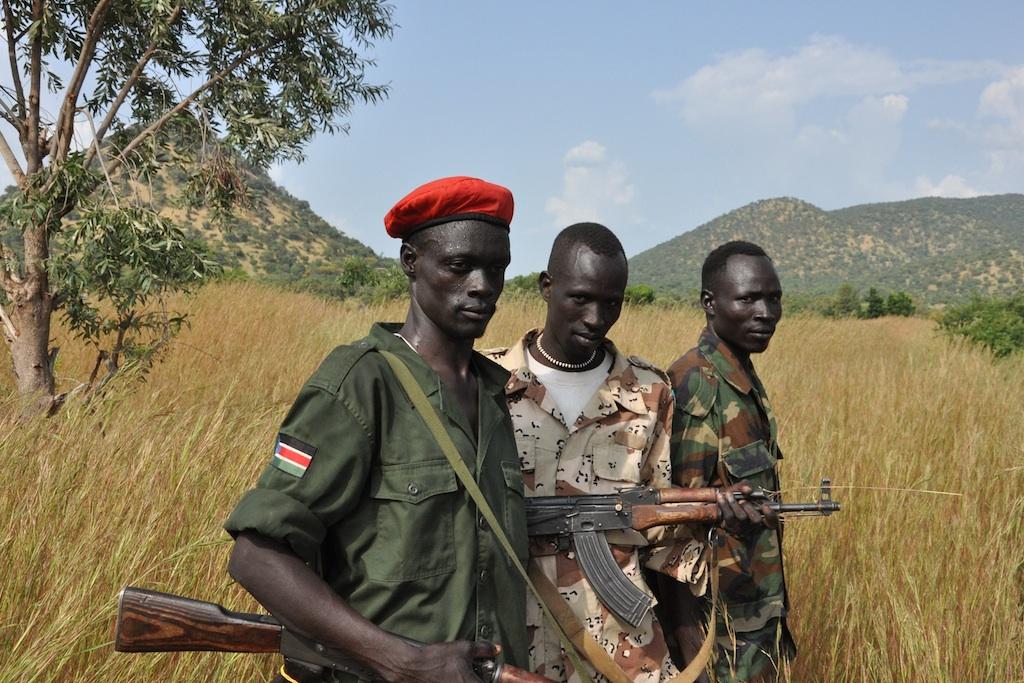Sudan battles rebels in Blue Nile state
SPLM-N fighters stand outside the village of Maiyas. An Antonov bomb recently struck the village the soldiers were guarding and killed six people.
KURMUK, Sudan — As the Antonov bomber planes flicker through the clouds, their whirring drone reaching crescendo as they circle above, 35-year-old rebel soldier Jeremiah Shaabi crouches to the floor.
“Oh, Antonov. It’s not good — it’s bad,” he said, pointing at the sky anxiously and ducking amid the long grassy fields dotted with baobab trees near the town of Kurmuk, a rebel stronghold in Sudan’s Blue Nile state.
Sudan, officially called the Republic of Sudan, is the nation that lies to the north of South Sudan, which gained its independence in July. Despite the South's independence, which followed decades of civil war and millions of deaths, fighting continues in border states like Blue Nile and South Kordofan.
In these border states, the government of Sudan President Omar al-Bashir is battling rebel groups who had sided with South Sudan for years, but now find themselves on the wrong side of the border.
Last week, Sudan claimed a major victory over the South when it seized Kurmuk, which lies in Blue Nile but straddles the Ethiopian border.
In Blue Nile, where Jeremiah Shaabi ran for cover, conflict has raged for nearly two months, since the Sudan Armed Forces (SAF) clashed with the SPLM-N, the political opposition party that has turned into a rebel force in the state capital, Damazin.
Shaabi said that he has been in the Sudan People's Liberation Movement-North (SPLM-N) since he was 14, when he fought alongside southern Sudan’s SPLA rebels during the civil war.
As the fighting continues, civilians suffer.
“We don’t have anything to eat. We just go into the bush, and then in the old farms we find some sorghum that is growing, and we just make porridge. We only eat once a day,” said Huwa Gundi, 21, sitting on a sheet outside a flimsy shelter near Sali, a town in Blue Nile near Kurmuk.
Her family of eight fled Sali weeks ago when the bombs came, but will not cross to nearby Ethiopia, where almost 29,000 refugees have sought safety.
“We don’t want to leave our land,” Gundi said. But the sorghum scavenged from abandoned farms won’t last much longer, and last week the Antonov bombed the place where she looks for gold in the river to try to sell in Kurmuk.
From one of his rebel hideouts, ousted Blue Nile governor turned SPLM-N rebel leader Malik Agar said Bashir had used Antonovs to scare half of Blue Nile state’s 1.2 million people out of their homes.
Accusing Khartoum of “using food as a weapon” by blocking aid agencies to the sorghum-rich area in the pre-harvest lean season, Agar said the bombs had killed 74 and wounded over 100 by early October.
Agar’s calls for Bashir to stop bombing and open corridors so that the local population can safely leave the area have fallen on deaf ears, as have calls for third-party talks.
Instead, Bashir has shunned mediation and has promised to crush further dissent after squashing Kurmuk “like a mosquito,” as rights groups say that escalating conflict in border regions is increasingly vicious and targeted along ethic lines.
Agar said that regardless of Sudan's superior firepower and weaponry, the rebels will fight until Bashir recognizes the diversity, rights and religion of all.
But Bashir announced that his government will adopt an Islamic constitution that enforces Shariah law.
"No country will defeat a guerilla movement," he said. His rebel group, he said, started in 1984 with 11 men, and there are "many angry young men who have come to join us."
In the capital, Khartoum, demonstrations over Sudan’s economic woes are rising with inflation since Sudan lost most of its oil to the South, and the carrot proffered by the US for peaceful secession was recently replaced by another year of sanctions.
“Bashir, in front of him, he has a very difficult chessboard to manage,” Agar said.
We want to hear your feedback so we can keep improving our website, theworld.org. Please fill out this quick survey and let us know your thoughts (your answers will be anonymous). Thanks for your time!
